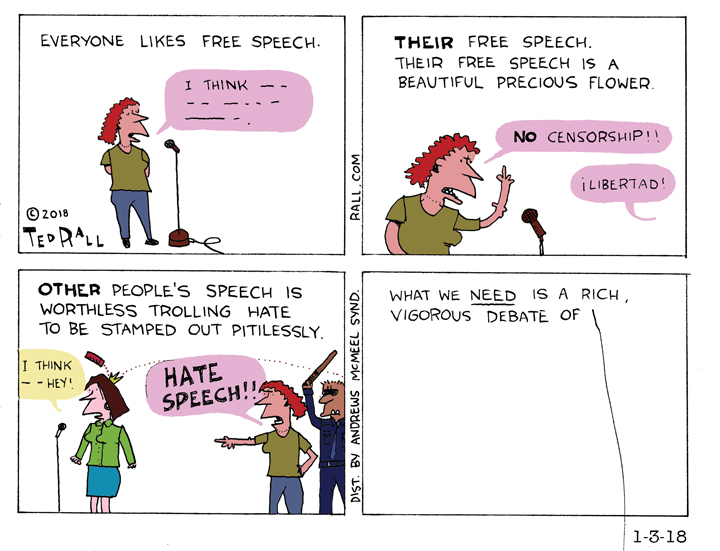Controversies over free speech on college campuses and othe place serve to remind us that free speech is in the eye of the beholder, and that people tend to disrespect expression they disagree with. The thing is, however, free speech really is a suicide pact. We’re either all in it together or not at all.
We All Love (Our) Free Speech

Ted Rall
Ted Rall is a syndicated political cartoonist for Andrews McMeel Syndication and WhoWhatWhy.org and Counterpoint. He is a contributor to Centerclip and co-host of "The TMI Show" talk show. He is a graphic novelist and author of many books of art and prose, and an occasional war correspondent. He is, recently, the author of the graphic novel "2024: Revisited."

11 Comments. Leave new
As the classic example of crying «Fire» in a crowded theatre shows, the question of «free speech» is not an easy one….
Henri
Actually, It is not actually true that we don’t have the right to cry fire in a crowded movie theater. Actually, the case was overturned later. It’s a very interesting story.
Tell us more, Ted! (?)
The English language version of Wikipedia has an article on this matter ; note that the case was not about someone who had (falsely) shouted «Fire !» in a crowded theatre, but rather someone who had dared to pass out leaflets opposing the draft for US participation in WW I. According to another Wikipedia article, the criteria established some fifty years later in Brandenburg v Ohio limiting free speech were the following : «The Court held that government cannot punish inflammatory speech unless that speech is “directed to inciting or producing imminent lawless action and is likely to incite or produce such action”». So as long as that «rich, vigorous debate» is neither designed nor likely to produce such action, it should be protected under the First Amendment of the US Constitution….
Henri
Brandenberg is effectively a reversal of Schenck versus United States‘ famous “crowded theater” formulation. It draws upon some of the reasoning but rejects Justice Holmes’ sweeping pro-censorship limits upon the First Amendment. The 1919 case outrageously and curiously asserts something few Americans believe now, that advocating for peace during wartime is tantamount to a form of provocative speech that is abominable and thus not covered by free speech rights.
Ted, please do teach me how to edit errors ! The second underlining above was meant to encompass only the phrase «another Wikipedia article»….
Henri
When I post a comment, there is an “edit” button at the bottom.
«When I post a comment, there is an “edit” button at the bottom.» That, Ted, is because you possess superpowers not vouchsafed to your humble readers ; when I post a comment, I see no such edit button. Perhaps you could prevail on your webmaster to leak some of those superpowers over to us ?…
Henri
PS : I agree – I think – with your interpretation of Brandenburg v Ohio, but I suspect that most US Supreme courts would consider falsely crying «Fire !» in a crowded theatre as «directed to producing or inciting imminent lawless action» and being likely to do so….
@Ted:
“few Americans believe now, advocating for peace during wartime is tantamount to a form of provocative speech”
As with much of our political system, it doesn’t matter if “few” Americans believe – so long as they have disproportionate power over the media.
Early in the everlasting Iraq war, anti-war protesters raised enough money to buy a Super Bowl ad. The network turned them down saying that it was too controversial.
But wait! They aired recruitment ads for the Army! Isn’t that the same controversy? They even played the national anthem – which was first played during a wartime baseball game.
The neo-liberal Clintonbots on gocomics proved the veracity of this cartoon.
‘It’s not censorship if we ban lies and hate speech, and everything every Trumpeter says is a lie and/or hate speech.’
Plus the hatred of Mr Rall for ‘strongly supporting Trump’*.
*Defn. ‘strongly supporting Trump’ Not voting for St Hillary.
SHUT THE CUFK UP LIBTARD!
😀 🙂 😀 😉
I do admire Ted’s hardline on free speech, this website is a good example. All views are tolerated; and many of the debates have become … uh … okay, “vigorous” is a word.
However, the lines in this discussion have been blurred – free speech does not grant you a right to a public platform. The other side of that coin is the infamous Citizens Untied decision – is it still free speech when someone with money gets a much, much bigger megaphone?